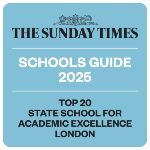Literacy & Numeracy
Literacy and Numeracy at the Vaughan
In September 2012, the school appointed two members of staff to oversee a new, wide-reaching Literacy and Numeracy Development Plan. This grew out of our awareness that confidence in these core skills is fundamental to our students’ ability to access and engage with all that the curriculum has to offer.
All teachers at the Vaughan consider themselves to be teachers of Literacy and Numeracy. We all share responsibility for promoting our students’ confident use of Standard English, their number skills and their ability to actively and critically engage with the world around them.
Our Development Plan, which was first implemented over the 2012-2013 academic year, is designed to promote these core skills both inside and outside of the classroom.
Supporting your child with Literacy and Numeracy
Extra-curricular reading
Pupils in the Lower School are all registered on our Accelerated Reader programme. This is a piece of software that tracks their progress as independent readers, makes book recommendations, and helps the school offer rewards for their reading. Each pupil is given a termly points target, which they write in the back of their diary; those who meet it are rewarded with House Points, and the top readers and most improved readers are presented with prizes on a termly basis.
Go to www.arbookfind.co.uk for a guide to the books available on the Accelerated Reader programme. Many of these are available in the school library.
The following reading guides list titles available in the school library. Many of these books are registered on the Accelerated Reader programme:
? First and Second Form reading guides
? GCSE reading guide
? ‘High and Mighty’: contemporary and classic fiction aimed at able readers in the Fifth and Sixth Forms
Further support with Literacy
You will find a literacy guide printed in the back of the pupil diary. Click here to read a copy of this guide. This is intended to offer your child support with core skills, like essay planning, spelling and punctuation. In particular, we suggest that pupils make use of the ‘Personal Spelling Dictionary’ at the back of their diary, a place where they can write down spellings which they find particularly challenging.
A simple encouragement to check through homework carefully could be enough to help your child address many basic literacy errors. Discussion and debate are the foundation of true understanding. Encourage your child to explain and to interrogate their own ideas. ‘Why do you think that?’; ‘What evidence do you have for that?’; ‘What would you say to someone who argued the opposite?’: questions such as these promote the type of critical thought which is fundamental to success at GCSE and beyond.
Year 7 Literacy & Numeracy Catch-Up Premium Funding
The Literacy and Numeracy Catch-Up Premium provides schools with an additional £500 for each First Form pupil who did not achieve at least Level 4 in English and/or Maths by the end of Key Stage 2.
In 2014-2015 we received £2,000 Literacy & Numeracy Catch-Up Premium Funding for four First Form pupils.
This money contributes to spending on:
? ‘Accelerated Reader’ licenses, and a selection of library books aimed at this attainment range.
? A significantly reduced class size (of approximately ten pupils), together with extensive, personalised support from a Learning Support Assistant.
? A range of personalised extra-curricular interventions put in place by our Learning Support Unit.
We assess the effect of these measures on attainment in Literacy & Numeracy through our termly whole-school tracking in English and Maths. In addition, as of 2014-2015, we are able to use ‘Star Reader’ tests to track the progress of pupil reading ages against national averages.
In 2013-2014 we received £3,500 Literacy & Numeracy Catch-Up Premium Funding for seven First Form pupils.
By the end of the First Form 100% of these pupils had achieved at least a Level 4 in English and Maths.




 Pay Online
Pay Online Arbor Parent Portal
Arbor Parent Portal
